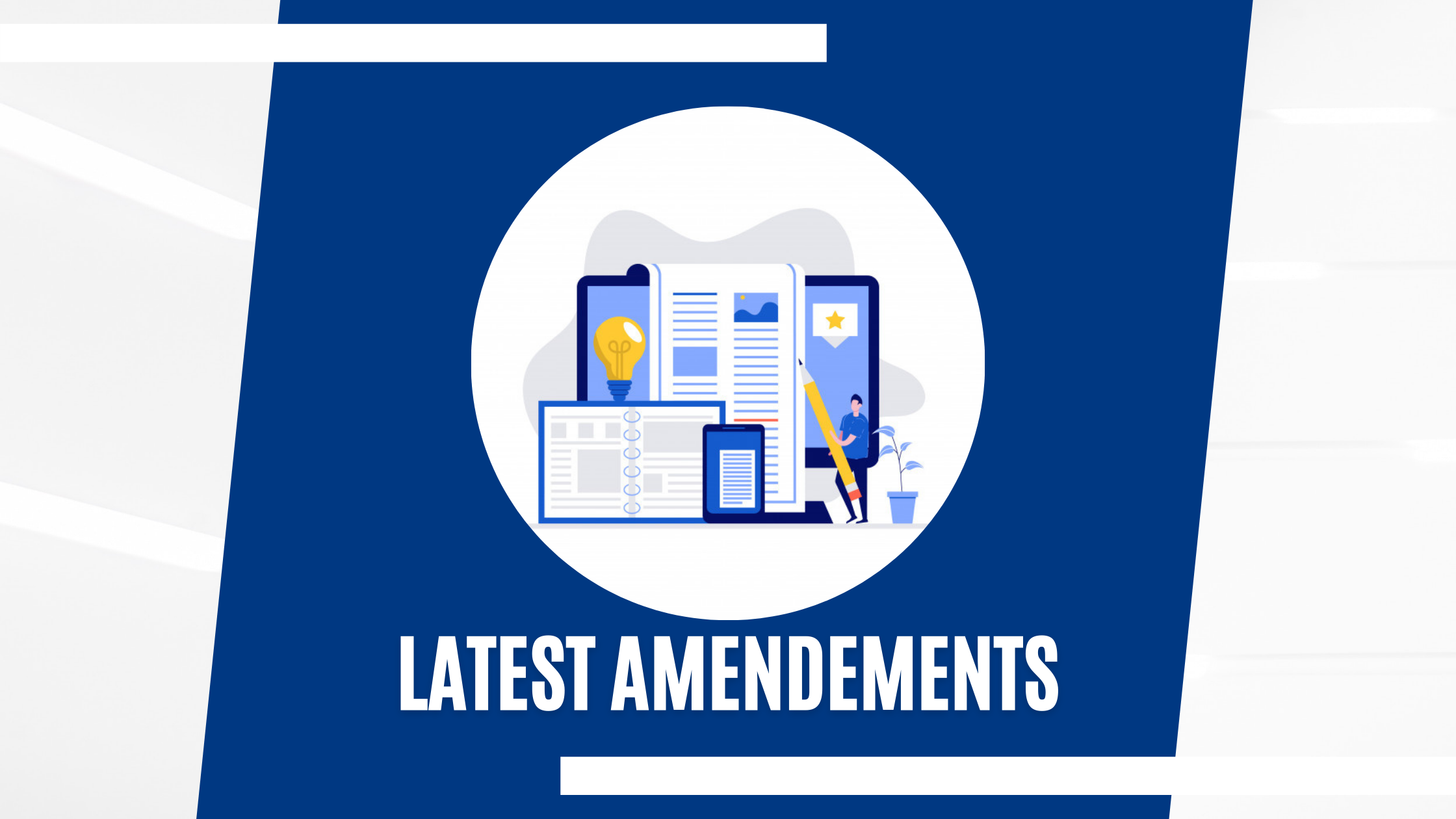Latest Amendments
AMENDMENTS
Companies (CSR Policy) Rules, 2014 with Companies (CSR Policy) Amendment Rules, 2021.
Rule 2
Important Definitions
(1) In these rules, unless the context otherwise requires, -
|
Topic |
Detailed Explanation |
|
Administrative overheads
|
"Administrative overheads" means the expenses incurred by the company for general management and administration of Corporate Social Responsibility functions in the company but shall NOT include the expenses directly incurred for the designing, implementation, monitoring, and evaluation of a particular Corporate Social Responsibility project or program; |
|
CSR Policy
|
"CSR Policy" means a STATEMENT containing the approach and direction given by the BOARD of a com and taking: Into account the recommendations of its CSR Committee, |
|
Corporate Social Responsibility (CSR)
|
"Corporate Social Responsibility (CSR)" means the activities undertaken by a Company in pursuance of its statutory obligation laid down in section 135 of the Act in accordance with the provisions contained in these rules, but shall not include the following, namely:-
|
|
|
Provided that any company engaged in research and development activity of new vaccine, drugs and medical devices in their NORMAL course of business may undertake research and development activity of new vaccine, drugs, and medical devices related to COVID-19 for financial years 2020-21, 2021-22, 2022-23 subject to the conditions that — (a) such research and development activities shall be carried out in collaboration with any of the institutes or organizations mentioned in item (ix) of Schedule VII to the Act; (b) details of such activity shall be disclosed separately in the Annual report on CSR included in the Boards Report; (ii) any activity is undertaken by the company OUTSIDE India except for training of Indian sports personnel representing any State or Union territory at national level or India at international level; (iii) contribution of any amount directly or indirectly to any POLITICAL PARTY u/s 182 of the Act; (iv) activities benefitting EMPLOYEES of the company as defined in section 2(k) of the Code on Wages, 2019; (v) activities supported by the companies on a SPONSORSHIP basis for deriving MARKETING BENEFITS for its products or services; (vi) activities carried out for fulfillment of any other STATUTORY obligations under any law in force in India; |
|
Topic |
Detailed Explanation |
|
|
and activities include guiding principles for selection. implementation and monitoring of as well as formulation of the annual action plan. |
|
"International Organisation |
"International Organisation” means an organization notified by the Central Government as an international organization u/s 3 of the United Nations (Privileges and Immunities) Act 1947, to which the provisions of the Schedule to the said Act apply; |
|
Net profit |
"Net profit" means the net profit of a company as per its financial statement prepared in accordance with the applicable provisions of the Act, but shall NOT include the namely:
Provided that in case of a FOREIGN company covered under these rules, net profit means the net profit of such company as per profit and loss account prepared in terms of section 381(1)(a), read with section 198 of the Act; |
|
Ongoing Project |
"Ongoing Project" means a multi-year project undertaken by a Company in fulfillment of its CSR obligation having timelines not exceeding 3 years excluding the financial year it was commenced and shall include such project that was initially no approved as a multi-year project but whose duration has been extended beyond 1 year by the Board based on reasonable justification; |
|
Public Authority |
"Public Authority" means Public Authority as defined in section 2(h) of the Right to Information Act, 2005;
|
Rule 3
Corporate Social Responsibility
(1) EVERY company including its HOLDING or SUBSIDIARY, and a FOREIGN company defined under section 2(42) of the Act having its branch office or project office in India, which fulfills the criteria specified in Section 135(1) of the Act shall comply with the provisions of section 135 of the Act and these rules:
Provided that net worth, turnover, or net profit of a foreign company of the Act shall be computed in accordance with balance sheet and Profit and loss account of such company prepared in accordance with the provisions of section 381(1)(a) and section 198 of the Act.
(2) Every company which CEASES to be a company covered under section 135(1) of the Act for 3 consecutive financial years shall not be required to —
(a) constitute a CSR Committee; and
(b) comply with the provisions contained in sub-section (2) to (6) of the said section, till such time it meets the criteria specified in section 135(1).
Rule 4
CSR Implementation
(1) The Board shall ensure that the CSR activities are undertaken by the company itself or through —
(a) a Section 8 company, or a registered public trust or a registered society, registered u/s 12A and 806 of the Income Tax Act, 1961 ESTABLISHED by the COMPANY, either singly or along with any other company, or
(b) a Section 8 company or a registered trust or a registered society, ESTABLISHED by the CG or SG. Or
(c) any STATUTORY ENTITY established under an Act of Parliament or a State legislature; or
(d) a Section 8 company, or a registered public trust or a registered society, registered u/s 12A and 80G of the Income Tax Act, 1961, and has an established track record of at least 3 years in undertaking similar activities.
(2) (a) Every entity, covered under sub-rule (1), who intends to undertake any CSR activity, shall register itself with the CG by filing the Form CSR —1 electronically with the Registrar, with effect from the 1st day of April 2021:
Provided that the provisions of this sub-rule shall not affect the CSR projects or programs approved prior to the 1st day of April 2021.
(b) Form CSR — 1 shall be signed and submitted electronically by the entity and shall be verified digitally by a CA/CS/CMA in practice.
(c) On the submission of the Form CSR — 1 on the portal a unique CSR Registration Number shall be generated by the system automatically.
(3) A company may engage international organizations for designing, monitoring, and evaluating the CSR projects or programs as per its CSR policy as well as for the capacity building of their own personnel for CSR.
(4) A company may also collaborate with other companies for undertaking projects or programs or CSR activities in such a manner that the CSR committees of respective companies are in a position to report separately on such projects or programs in accordance with these rules.
(5) The Board of a company shall satisfy itself that the funds so disbursed have been utilized for the purposes and in the manner as approved by it and the CFO (Chief Financial Officer) or the person responsible for financial management shall certify to the effect.
(6) In case of an ONGOING project, the Board of a Company shall monitor the implementation of the project with reference to the approved timelines and year-wise allocation and shall be competent to make modifications, if any, for smooth implementation of the project within the overall permissible time period.
Rule 5
CSR Committees
(1) The companies mentioned in rule 3 shall constitute CSR Committee as under.-
(I) a company covered under section 135(1) which is not required to appoint an independent director pursuant to section 149(4) of the Act, shall have its CSR Committee without such director ;
(ii) a private company having only 2 directors on its Board shall constitute its CSR Committee with 2 such directors;
(iii) with respect to a foreign company covered under these rules, the CSR Committee shall comprise of at least 2 persons of which one person shall be as specified under section 380(1)(d) of the Act and another person shall be nominated by the foreign company.
(2) The CSR Committee shall formulate and recommend to the Board, an ANNUAL ACTION PLAN in pursuance of its CSR policy, which shall include the following, namely:-
(a) the list of CSR projects or programs that are approved to be undertaken in areas or subjects specified in Schedule VII of the Act;
(b) the manner of execution of such projects or programs as specified in sub-rule (1) of rule 4;
(c) the modalities of utilization of funds and implementation schedules for the projects or programs;
(d) monitoring and reporting mechanism for the projects or programs; and
(e) details of need and impact assessment, if any, for the projects undertaken by the company:
Provided that Board may alter such plan at any time during the financial year, as per the recommendation of its CSR Committee, based on the reasonable justification to that effect.
Rule 6
CSR Policy
OMITTED by Companies (Corporate Social Responsibility Policy) Amendment Rules, 2021.
Rule 7
CSR Expenditure
- The board shall ensure that the administrative overheads shall not exceed 5% of the total CSR expenditure of the company for the financial year.
(2) Any SURPLUS arising out of the CSR activities shall NOT form part of the business profit of a company and shall be ploughed back into the same project or shall be transferred to the Unspent CSR Account and spent in pursuance of CSR policy and annual action plan of the company or a transfer such surplus amount to a Fund specified in Schedule VII, within a period of 6 months of the expiry of the financial year.
(3) Where a company spends an amount in excess of requirement provided u/s 135(5), such excess amount may be SET-OFF against the requirement to spend u/s 135(5) up to immediate succeeding 3 financial years subject to the conditions that —
- the excess amount available for set-off shall NOT include the surplus arising out of the CSR activities, if any, in pursuance of sub-rule (2) of this rule.
- the Board of the company shall pass a BOARD RESOLUTION to that effect.
(4) The CSR amount may be spent by a company for the creation or acquisition of a CAPITAL ASSET, which shall be held by —
(a) a Section 8 company, or a Registered Public Trust or Registered Society, having charitable objects and CSR Registration Number under sub-rule (2) of rule 4; or
(b) beneficiaries of the said CSR project, in the form of self-help groups, collectives, entities; or
(c) a public authority:
Provided that any CAPITAL ASSET created by a company PRIOR to the commencement (22-Jan-2021) of the Companies (Corporate Social Responsibility Policy) Amendment Rules, 2021, shall within a period of 180 days from such commencement (22-Jan-2021) comply with the requirement of this rule, which may be extended by a further period of not more than 90 days with the approval of the Board based on reasonable justification.
Rule 8
CSR Reporting
(1) The Boards Report of a company covered under these rules pertaining to any financial year shall include an Annual Report on CSR containing particulars specified in Annexure I or Annexure II of these Rules.
(2) In the case of a FOREIGN company, the Balance Sheet filed u/s 381 (1)(b) of the Act, shall contain an annual report on CSR containing particulars specified in Annexure I or Annexure II of these Rules.
(3)
(a) Every company having an average CSR obligation of > Rs. 10 crores in pursuance of section 135(5) of the Act, in the 3 immediately preceding financial year shall undertake IMPACT assessment, through an INDEPENDENT agency of their CSR projects having outlays of > Rs.1 crore, and which have been completed not less than 1 year before undertaking the impact study.
(b) The impact assessment reports shall be placed before the Board and shall be annexed to the annual report on CSR.
(c) A Company undertaking impact assessment may book the Impact assessment expenditure towards Corporate Social Responsibility for that financial year, which shall not exceed LOWER of:-
(i) 5% of the total CSR expenditure for that financial year or
(ii) 50 lakhs.
Rule 9
Display of CSR activities on its website
The Board of Directors of the Company shall mandatorily disclose the composition of the CSR Committee, and CSR Policy and Projects approved by the Board on their website, if any, for public access.
Rule 10
Transfer of unspent CSR amount
Until a fund is specified in Schedule VII for the purposes of Section 135(5) & (6), the unspent CSR amount, if any, shall be transferred by the company to any fund included in schedule VII of the Act.
Clarification on the spending of CSR Funds for Awareness and Public outreach on COVID-19 Vaccination Programme.
In continuation to this Ministrys General Circular No. 10/2020 dated 23.03.2020 wherein it was clarified tha spend ng of CSR funds for COVID-19 is an eligible CSR activity; it is further clarified that spending of CSR funds for the following activities is eligible.
|
|
Activities relating to COVID-19 Eligible under Schedule VII |
Item of Schedule VII |
|
1
|
Carrying out AWARENESS campaigns/programs or PUBLIC OUTREACH campaigns on COVI D-19 VACCINATION Programme. |
Items (i), (ii) and (xii) |
|
2 |
Setting up Makeshift Hospitals & Temporary COVID Care Facilities. |
Items (i) and (xii)
|
SCHEDULE VII
Activities that may be included by companies in their CSR Policies
|
Topic
|
Detailed Discussion |
|
Schedule VII Item (ix)
|
Activities that may be included by companies in their CSR Policies
|
|
Activities relating to:— ( ix) Contribution to :- 1. incubators or research and development projects in the field of science, technology, engineering, and medicine, funded by Central Government or State Government or any agency or PSU, 2. public-funded Universities, 3. Indian Institute of Technology (I ITs), 4. National Laboratories and 5. Autonomous bodies established under – (a) Department of Atomic Energy (DAE); (b) Department of Biotechnology (DBT); (c) Department of Science and Technology (DST); (d) Department of Pharmaceuticals; Ministry of Ayurveda, Yoga, and Naturopathy, Unani, Siddha and Homoeopathy (AYUSH); (e) Ministry of Electronics and Information Technology and other bodies, namely Defense Research and Development Organisation (ORDO); (f) Indian Council of Agricultural Research (ICAR); (g) Indian Council of Medical Research (ICMR) and (h) Council of Scientific and Industrial Research (CSIR), engaged in conducting research in science, technology, engineering and medicine aimed at promoting Sustainable Development Goals (SDGs)".
|
Rule 3(1)
Manner of Books of Account to be Kept in Electronic Mode u/s 128
In the Companies (Accounts) Rules, 2014, in rule 3(1), the following proviso shall be inserted, namely:-
Manner of Books of Account to be Kept in Electronic Mode
- The books shall remain accessible in India.
Provided that for the financial year commencing on or after the 1st day of April 2022 every company which uses accounting software for maintaining its books of account, shall use only such accounting software which has a feature of recording audit trail of each and every transaction, creating an edit log of each change made in books of account along with the date when such changes were made and ensuring that the audit trail cannot be disabled.
Rule 8(5)
Additional Matters in Board Report u/s 134
In the Companies (Accounts) Rules, 2014, in rule 8(5), after clause (x), the following clauses shall be inserted namely:-
Additional Matters in Board Report u/s 134:-
(xi) the details of an application made or any proceeding pending under the Insolvency and Bankruptcy Code, 2016 during the year along with their status as at the end of the financial year.
(xii) the details of the difference between the amount of the valuation done at the time of one-time settlement and the valuation done while taking a loan from the Banks or Financial Institutions along with the reasons thereof.
Inter Audit Chapter Amendments
|
Point |
Explanation |
|
|
Sec 143(3) read with Sec 197(16) |
Auditors Report must contain comments on Managerial Remuneration: - "In our opinion, the managerial remuneration for the year ended March 31, 2021, has been paid/provided by the Company to its directors in accordance with the provisions of section 197 read with Schedule V to the Act." |
|
|
Cost Audit Rules
|
The requirement for cost audit under shall NOT apply to a company – (1) Whose revenue from EXPORTS, in foreign exchange, exceeds 75% of its total revenue; or (2) Which is operating from a SPECIAL ECONOMIC ZONE; or (3) Which is engaged in the generation of electricity for captive consumption through Captive Generating Plant. |
|
|
Companies (Amendment) Act 2020 |
NEW Punishments under Companies (Amendment) Act 2020 has been notified and commenced. So, there is no need to study OLD Punishments under Section 140(3), 143(15), and 147. We have to study the new Punishments only. |
|
|
Sec 143(3) Rule 11 Other Matters to be Included in Auditors Report |
Other Matters to be included in Auditors Report The auditors report shall also include their views and comments on the following matters, namely:- (a) whether the company has disclosed the impact, if any, of pending litigations on its financial position in its financial statement; (b) whether the company has made provision, as required under any law or accounting standards, for material foreseeable losses if any on long term contracts including derivative contracts; (c) whether there has been any delay in transferring amounts, required to be transferred, to the Investor Education and Protection Fund by the company. (d) whether the company had provided requisite disclosures in its financial statements as to holdings as well as dealings in specified bank notes during the period from 8th November 2016 to 30th December 2016 and if so, whether these are in accordance with the books of accounts maintained by the company. (e) (i) Whether the management has represented that, to the best of its knowledge and belief, other than as disclosed in the notes to the accounts, no funds have been advanced or loaned or invested (either from borrowed funds or share premium or any other sources or kind of funds) by the company to or in any other person(s) or entity(ies), including foreign entities ("Intermediaries") with the understanding, whether recorded in writing or otherwise, that the Intermediary shall whether directly or indirectly lend or invest in other persons or entities identified in any manner whatsoever by or on behalf of the company ("Ultimate Beneficiaries") or provide any guarantee, security or the like on behalf of the Ultimate Beneficiaries;
(f) Whether the dividend declared or paid during the year by the company is in compliance with section 123 of the Companies Act, 2013. (g) Whether the company, in respect of financial years commencing on or after the 1st April 2022, has used such accounting software for maintaining its books of account which has a feature of recording audit trail (edit log) facility and the same has been operated throughout the year for all transactions recorded in the software and the audit trail feature has not been tampered with and the audit trail has been preserved by the company as per the statutory requirements for record retention.
|
Inter Audit Amendments MAY-2021
|
Point |
Explanation |
|
|
CARO 2016 |
ICAI has notified that for May-2021, the old CARO 2016 will be applicable. CARO 2016 Classes (total 3 classes) are already uploaded on YouTube. CARO 2016 V Class: https://voutu.be/2SH 5r QGUE CARO 2016 2nd Class: https://voutu.be/g2Poi3eT5eQ CARO 2016 3"I Class: https://voutu.be/43i3T.INOssM |
|
|
Companies Amendment Act 2020 |
CAA-2020 is NOT applicable for May-June 2021 Exams. Its Sections have commenced from 21-Dec-2020 and hence are NOT applicable for May-June 2021 Exams. Therefore, Students have to learn the OLD Punishments only. |
|
|
Sec 143(3) read with Sec 197(16) |
Auditors Report must contain comments on Managerial Remuneration: - "In our opinion, the managerial remuneration for the year ended March 31, 2021, has been paid/provided by the Company to its directors in accordance with the provisions of section 197 read with Schedule V to the Act." |
|
|
Cost Audit Rules |
The requirement for cost audit under shall NOT apply to a company – (1) Whose revenue from EXPORTS, in foreign exchange, exceeds 75% of its total revenue; or (2) Which is operating from a SPECIAL ECONOMIC ZONE; or (3) Which is engaged in the generation of electricity for captive consumption through Captive Generating Plant.
|
Sec 143(3): Audit Report Amendments
|
Point
|
Explanation
|
|
Sec 143(3) Rule 11 Other Matters to be included in Auditors Report
|
Other Matters to be included in Auditors Report The auditors report shall also include their views and comments on the following matters, namely:- (a) whether the company has disclosed the impact, if any, of pending litigations on its financial position in its financial statement; (b) whether the company has made provision, as required under any law or accounting standards, for material foreseeable losses if any, on long term contracts including derivative contracts; (c) whether there has been any delay in transferring amounts, required to be transferred, to the Investor Education and Protection Fund by the company. (d) whether the company had provided requisite disclosure in its financial statements as to holdings as well as dealings in specified banks notes during the period from 8th November 2016 to 30th December 2016 and if so whether these are in accordance with the books of accounts maintained by the company. (e) (i) Whether the management has represented that, to the best of its knowledge and belief, other than as disclosed in the notes to the accounts, no funds have been advanced or loaned or invested (either from borrowed funds or share premium or any other sources or kind of funds) by the company to or in any other person(s) or entity(ies), including foreign entities ("Intermediaries"), with the understanding, whether recorded in writing or otherwise, that the Intermediary shall whether directly or indirectly lend or invest in other persons or entities identified in any manner whatsoever by or on behalf of the company ("Ultimate Beneficiaries") or provide any guarantee, security or the like on behalf of the Ultimate Beneficiaries: (ii) Whether the management has represented, that, to the best of its knowledge and belief, other than as disclosed in the notes to the accounts, no funds have been received by the company from any person(s) or entity(ies), including foreign entities ("Funding Parties") with the understanding, whether recorded in writing or otherwise that the company shall, whether, directly or indirectly, lend or invest in other persons or entities identified in any manner whatsoever by or on behalf of the Funding Party ("Ultimate Beneficiaries") or provide any guarantee, security or the Jike on behalf of the Ultimate Beneficiaries; and 3. Based on such audit procedures that the auditor has considered reasonable and appropriate in the circumstances, nothing has come to the notice that has caused them to believe that the representations under sub-clause (i) and (ii) contain any material misstatement. (f) Whether the dividend declared or paid during the year by the company is in compliance with section 123 of the Companies Act, 2013. (g) Whether the company, in respect of financial years commencing on or after the 1st April. 2022, has used such accounting software for maintaining its books of account which has a feature of recording audit trail (edit log) facility and the same has been operated throughout the year for all transactions recorded in the software and the audit trail feature has not been tampered with and the audit trail has been preserved by the company as per the statutory requirements for record retention.
|
|
Sec 143(3) read with Sec 197(16)
|
Auditors Report must contain comments on Managerial Remuneration: - "In our opinion, the managerial remuneration for the year ended March 31, 2021, has been paid/provided by the Company to its directors in accordance with the provisions of section 197 read with Schedule V to the Act."
|
Major Amendment in Ca Final Law Managerial
Remuneration Section 149, 197 & Schedule V
Schedule V — Part II — Remuneration
Explanation– For the purposes of Section I, Section II, and Section III, the term "or another director" shall mean:-
(a) a non-executive director or
(b) an independent director.
Section I - Remuneration payable by companies having profits.
Subject to the provisions of section 197, a company having profits in a financial year may pay remuneration to a managerial person or persons or other director or directors not exceeding the limits specified in such section.
Section II - Remuneration payable by companies having no profit
Where in any financial year during the currency of tenure of a managerial person or another director a company has no profits or its profits are inadequate, it may pay remuneration to the managerial person or another director not exceeding the limits under (A) and (B) given below:-
(A)
|
|
Effective Capital (rs. in crores)
|
Limit of yearly remuneration payable shall not exceed (rs.) In case of Managerial Person
|
Limit of yearly remuneration payable shall not exceed (rs.) In case of Other Director
|
|
|
Negative or < Rs. 5 cr
|
60 lakhs
|
12 lakhs
|
|
|
>Rs. 5 cr but < Rs. 100 cr |
84 lakhs |
17 lakhs |
|
|
> Rs.100 cr but < Z 250 cr |
120 lakhs |
24 lakhs |
|
|
>Rs. 250 crores |
120 lakhs plus 0.01% of the effective capital in excess of Rs. 250 crores. |
24 lakhs plus 0.01% of the effective capital in excess of Rs. 250 crores.
|
Inter Law Amendments MAY-2021
Amendment Summary
|
Point
Companies Amendment Act 2020
|
Explanation
CAA-2020 is NOT applicable for May-June 2021 Exams. Its Sections have commenced from 21-Dec-2020 and hence is NOT applicable for May-June 2021 Exams. Therefore, Students have to learn the OLD Punishments only.
|
||||||||||||
|
Penalties Chart
|
Penalty Chart (Inter Law) for reference. https://youtu.be/wZ80HbUIBBs
|
||||||||||||
|
Inter Law ALL Amendments Full Video Nov-Dec 2020
|
Dear Student, This previous Amendment Video contains lot of topics included for May-21 Amendment Also. It is divided Topic Wise as shown below. https://youtu.be/9z1azdebnY1 00:00:00 - Intro 00:04:40 - Incorporation, OPC, Sec 8 01:08:33 - Memorandum & Articles 02:31:08 - Prospectus & Allotment 03:31:09 - Share Capital & Debentures 05:35:25 - Deposits Extra Rules 06:26:39 - Charges, Registers, Meetings 06:54:47 – NFRA 07:10:50 – CSR
|
||||||||||||
|
Section 42 Rule 14 Private Placement (Allotment Chapter)
|
There is an Amendment in case Securities are allotted on a Private Placement basis to Qualified Institutional Buyers. "Provided also that in case of offer or invitation of any securities to QIB (Qualified Institutional Buyers) it shall be sufficient if the company passes a previous SR only once in a year for all the allotments to such buyers during the year." (Inserted by Companies (Prospectus and Allotment of Securities) Amendment Rules, 2020)
|
||||||||||||
|
Start Up Company Definition and Limits
|
(1) Tenure of Start-Up Status & Exemptions is now increased up to 10 years for all Companies. (2) Turnover Limit of Start-Up Companies is now increased up to noo crores p.a. (3) DIPP (Department of Industrial Policy and Promotion) has now been changed to DPIIT (Department for Promotion of Industry and Internal Trade). Therefore, everywhere in Company Law, Exemption to Startup Companies is now available for up to 10 years.
|
||||||||||||
|
Section 71 Rule 18
|
The Entire Topic of Debentures including DRR & DRF is covered in the previous Amendment Video https://voutu.be/9zlcizdebnYl @ 03:31:09. |
||||||||||||
|
Debentures DRR & DRF
|
I have reproduced the Notes of DRR & DRF below for your reference. There is only 1 Amendment in there. "The requirement of 15% DRF in case of Private Placement has been removed w.e.f.5th June 2020."
|
||||||||||||
|
Section 2(31) Rule 2(1)(c) Deposits Definition
|
The Entire Discussion on the Deposits Definition is covered in the previous Amendment Video h tps://voutu.be/9z1azdebnY1 @ 05:35:25. Few More items have been added to the Exclusion List under Rule 2(1)(c).
|
||||||||||||
|
Section 92 Rule 12 Extract of Annual Return
|
The extract of the annual return to be attached with the Boards Report shall be in Form No. MGT.9. "Provided that a company shall not be required to attach the extract of the annual return with the Boards report in Form No. MGT.9, in case the web link of such annual return has been disclosed in the Boards report in accordance with section 92(3) of the Companies Act, 2013."
|
||||||||||||
|
Section 135 Rule 2(1)(e) CSR Policy Definition
|
"CSR Policy relates to the activities to be undertaken by the company in areas or subjects specified in Schedule VII to the Act and the expenditure thereon EXCLUDING activities undertaken in pursuance of the NORMAL course of business of a company; Provided that any company engaged in research and development activity of new vaccine. drugs and medical devices in their NORMAL course of business may undertake research and development activity of new vaccine, drugs, and medical devices related to COVID-19 for financial years 2020-21, 2021-22, and 2022-23 subject to the conditions that-
|
||||||||||||
|
Schedule VII Item (ix)
|
Activities relating to:— (ix) Contribution to :- 1. incubators or research and development projects in the field of science, technology, engineering, and medicine, funded by Central Government or State Government or any agency or PSU, 2. public-funded Universities, 3. Indian Institute of Technology (IITs), 4. National Laboratories and 5. Autonomous bodies established under – (a) Department of Atomic Energy (DAE); (b) Department of Biotechnology (DBT); (c) Department of Science and Technology (DST); (d) Department of Pharmaceuticals; Ministry of Ayurveda, Yoga, and Naturopathy, Unani, Siddha and Homoeopathy (AYUSH); (e) Ministry of Electronics and Information Technology and other bodies, namely Defense Research and Development Organisation (DRDO); (f) Indian Council of Agricultural Research (ICAR); (g) Indian Council of Medical Research (ICM R) and (h) Council of Scientific and Industrial Research (CSIR), engaged in conducting research in science, technology, engineering and medicine aimed at promoting Sustainable Development Goals (SOGs)".
|
Section 71
Debentures DRR b DRF (Rule 18) -
The company shall comply with the requirements with regard to Debenture Redemption Reserve (DRR) and investment/deposit in Debenture Redemption Fund (D RF1 in respect of debentures maturing during the year ending on the 3r1 day of March of next year, in accordance with the conditions given below:-
|
S.NO.
|
Type of Company |
Mode of Issue of Debentures |
DRR Needed? |
How much DRR? |
How much DRF? |
|
|
All India Financial Institutions (AIFI) And Banking Companies |
Public Issue or Private Placement |
NO. |
N/A. |
N/A |
|
|
Public Financial Institution (PFI) |
Public Issue Private Placement |
Same as for NBFC |
Same as for NBFC |
N/A |
|
|
Listed Companies except (i) |
(A) Public Issue (Listed NBFC/HFC) |
NO. |
N/A. |
15%(*)
|
|
|
|
(A) Public Issue (other Listed Co.) |
NO. |
N/A. |
15%(*)
|
|
|
|
(B) Private Placement (Listed NBFC/HFC) |
NO. |
N/A. |
N/A( |
|
|
|
(B) Private Placement (other Listed Co.) |
NO. |
N/A. |
N/A(#) |
|
|
Unlisted Companies except (i) |
(A) Unlisted NBFC/HFC |
NO. |
N/A. |
N/A(#)
|
|
|
|
(B) Other Unlisted Companies |
YES
|
|
15%(*)
|
|
(*) |
15% of the number of its debentures maturing during the year ending on the 31" March of next year should be invested or deposited in the following investments/deposits within 30th April of current year:-(A) in deposits with any scheduled bank, free from any charge or lien; (B) in unencumbered securities of the Central Government or any State Government; (C) in unencumbered securities mentioned in sub-clause (a) to (d) and (ee) of section 20 of the Indian Trusts Act, 1882; (D) in unencumbered bonds issued by any other company which is notified under sub-clause (1) of section 20 of the Indian Trusts Act, 1882: Provided that the amount invested or deposited as above shall not be used for any purpose other than for redemption of debentures maturing during the year referred above.
|
||||
|
(#) |
The requirement of 15% DRF in case of Private Placement has been removed w.e.f.511 June 2020. (Amendment)
|
||||
|
Note 1 |
DRR shall be created out of profits of the company available for payment of dividends.
|
||||
|
S.NO. |
Type of Company |
Mode of Issue of Debentures |
DRR Needed? |
How much DRR? |
How much DRF? |
|
Note 2 |
In the case of Partly Convertible Debentures DRR shall be created only in respect of the non-convertible portion of debentures. |
||||
|
Note 3 |
The amount credited to DRR shall not be utilized by the company except for the purpose of redemption of debentures.
|
||||
Also Read:-













